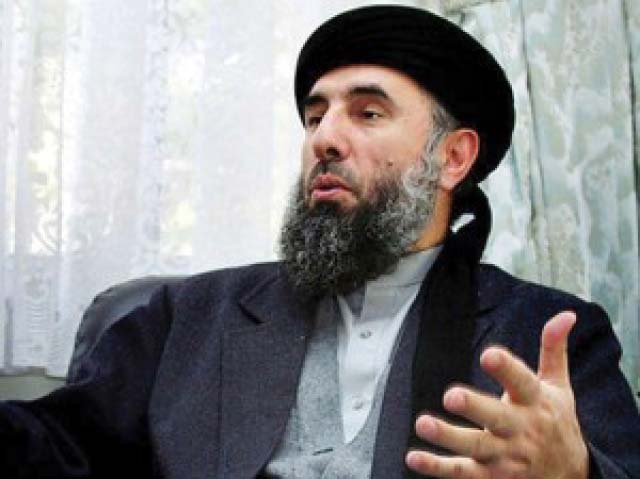With peace talks between Taliban and the Afghan government in a stalemate, the Afghan government welcomed Hekmatyar-led Hizb-e Islami’s move to enter the talks backed by the four-nation coordination group of Afghanistan, Pakistan, China and the United States. According to media reports, members of the militant group had their first meeting with Afghan High Peace Council officials last Thursday. Government officials have expressed hope that resumption of talks with Hizb-e Islami militant group would pave the way for other groups to take part in the peace negotiations. Hizb-e Islami’s green signal to join the peace initiative comes at a time when the Taliban have refused to participate in the talks which were planned to take place in Islamabad.
The move by Hizb-e Islami to join talks with the Afghan government does not seem to be a big prize for progress of the four-way peace initiative that is overshadowed by Taliban refusal to take part in its first meeting. The group has also negotiated with the government in the past. However, those talks did not led to a substantial breakthrough on demands of the Hizb-e Islami group. The announcement by the militant group that it was ready to start talking with the government just came as a side development that is deemed to be somewhat helpful for Afghan government’s peace efforts. However, it is not expected to affect the recent stance taken by main Taliban group in refusing to participate in the talks.
Hizb-e Islamic Hekmatyar once was one of the leading insurgent groups in Afghanistan organizing major attacks against the Afghan government and the US-led NATO coalition in the country. However, its power in the stage of jihad in Afghanistan has substantially diminished with other militant groups dominating the insurgency in the country. Some still label Hizb-e Islami as the second largest insurgent group after the Taliban, and suggest that readiness of the group to negotiate with the Afghan government is a major breakthrough. This is while the group’s militant activities have become very limited than many years before when it was operating as a powerful ally of the Taliban. Hizb-e Islamic is now believed to have limited capabilities in taking part in the ongoing insurgency led by the Taliban.
There have been many factors behind the Hizb-e Islami’s gradual decline in the anti-government insurgency. Perhaps the most important one is the gradual erosion of the group’s senior leadership over the last decade. The group has undergone splits with some offshoots operating as legal political parties and many senior members assuming higher positions in the government. With many splinter branches of the group operating as legal political parties, Hekmatyar’s own militant group has become weakened and seems to continue declining. Another factor is emergence of other militant groups who have greater insurgency activities against the government and NATO forces. Emergence or dominance of groups such as the Islamic State and Haqqani network has left little room for the Hizb-e Islami to have strong influence in the on going insurgency.
On the other hand, Hizb-e Islamic has sought a much more different approach and ideology in the fight against NATO and the Afghan government. The main objective for Hekmatyar’s hizb-e Islami militant group seem to have been attaining a share of political power rather than fighting a merely ideological jihad against the Afghan government and foreign forces stationed in the country. This is what differentiates between Hizb-e Islami and the Taliban along with many other militant groups and is important for any peace talks in the future.
The key question is that will the talks with Hizb-e Islami help to reach Taliban and end the conflict in the country. Or, will seek parallel talks with militant groups such as Hizb-e Islami help to decrease violence? There have long been two different but sometimes conflicting ideas on ways of seeking talks with the militant groups with the aim to weaken the militants and eventually end the conflict. One is the approach to make peace with the Taliban as a whole to end war and violence and put an end to the bloody fifteen years of insurgency. This has been so far the main approach as the Taliban is viewed to be spearheading the main bulk of the insurgency.
Another strategy recommended for long time has been to seek parallel talks with insurgent groups and the pro-peace members of the Taliban with the aim to weaken the insurgency by splitting the Taliban. However, Taliban have proved to be led by powerful and highly centralized leadership. Afghan government’s attempts to contact with so-called moderate Taliban leaders have simply not worked. The Taliban leaders who have been in contact with the Afghan government over peace issues have been quickly removed or killed. Given the facts on the ground, the Afghan government has no option but to focus on talk with the Taliban as a unified insurgent group who have influence over many of other militant groups as well.
Therefore, the talks with Hizb-e Islamic are difficult to reach a substantial outcome. While the government needs to negotiate with the Taliban, Hizb-e Islamic has no or little influence over Taliban and its ideology and approach are far different from the Taliban. The government may not be prepared to consider important political concessions for a group who do not have much weight in the insurgency and whose denounce of violence would not substantially decrease violence or end the conflict. Even if there are progresses in talks between the government and Hizb-e Islami party, the government will have to wait for the Taliban to come to the table of peace negotiations. However, successes in talks with Hizb-e Islami will set a pattern for negotiations with the Taliban and other militant groups.
Home » Opinion » Will Talks with Hizb-e Islami Help Peace Process?
Will Talks with Hizb-e Islami Help Peace Process?
| Abdul Ahad Bahrami

